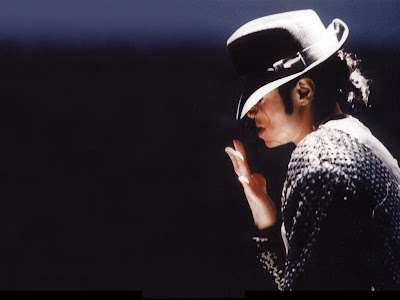Only Michael Jackson could have done so much so quickly to obscure the ass-shaking, barrier-breaking brilliance of his own music.
He was that famous.
It’s always pissed me off, and never more so than today — when Jackson finally succumbed to the swirling demons of his own life.
I think even his biggest fans wrestle with the same essential dichotomies: Pioneering artist/seriously weird dude. Knee-slapping entertainer/perhaps a pedophile.
He was, sadly, most of those things, and more. Instinctively musical, yet boldly self destructive. Devastated by fame, and somehow still captive to its allure.
Me, I just like the songs, and I wish the guy himself hadn’t kept getting in the way. Mostly because Michael Jackson, as the cable age dawned from 1979-1985, accomplished more in bringing together black and white America than any politician of the day. More than any treaty could.
See, Jackson — more than Miles Davis, or Ray Charles or even Stevie Wonder — was part of a televised revolution. He created a high-tech vista that definitively stretched across race, creed and MTV.
His records (or, in the parlance of the day, his videos) were, then and now, the kind of memorably illuminating moments reserved for history’s great battles. It was like hearing the Gettysburg address set to a grease-popping bass line. None of us — none of us — could ignore what was happening. He was the popularizer of everything the great black artists, from Satchmo and Muddy on down, had once fought so hard for.
Of course, even as Jackson went supernova, with the fedora and the glittering glove in 1983 on that Motown special, there was the odd idiosyncrasy. Namely, yeah, the fedora, and the glittering glove.
It got worse.
Childhood superstardom as a member of the Jackson 5, we see now, had robbed Michael Jackson of something, and he eventually descended into a maze of increasingly troubled choices in an apparent effort to recreate that stolen youth.
He never bested a period that began with “Off The Wall,” Jackson’s most complete solo record; followed by “Thriller,” which became the biggest selling album of all time; and then the blockbuster “We Are The World.” Perhaps luckily, Jackson never needed to — since the bizarre behavior of his final years obscured much, if not all, of that magic.
He’d moved from being this angelically Afroed, sweet-voiced Pied Piper for racial tolerance — with his siblings as part of the Jackson Five (with whom he scored eight Top-10 pop singles and 18 Top-10 R&B singles, most before reaching his teens) — into something of both wider and deeper importance: A telegenically cultural force, and a damn good time.
 Cut to “Rock With You,” a sexy, danceable and insistently upbeat hit from 1979’s “Off The Wall” (which has sold 7 million units in the U.S. and more than 20 million copies worldwide). For me, it still encapsulates everything that made Michael Jackson matter.
Cut to “Rock With You,” a sexy, danceable and insistently upbeat hit from 1979’s “Off The Wall” (which has sold 7 million units in the U.S. and more than 20 million copies worldwide). For me, it still encapsulates everything that made Michael Jackson matter.
For one thing, this tune retains the last lingering echoes of Jackson’s open-hearted youth, a bright bloom of guiltless joy before he began to overthink things on increasingly commercial follow ups.
Producer Quincy Jones also puts an indelible mark on “Rock With You,” crafting a song both feathery and explosive — something that fit in perfectly with the soft rock then dominating the pop charts even as it nudged the mainstream closer to genre-bending R&B joys still to come from Jackson.
Just as importantly, Jackson completely inhabits his now-famous whip-smart falsetto, effortlessly reeling off a hip disco-update of Smokey Robinson and Curtis Mayfield. And not just in tone: He showed he could take the kind of emotional risks in both phrasing and timbre associated with those established icons.
“Thriller,” then, blew open the doors — reportedly selling more than 100 million copies so far worldwide and winning a record-breaking seven Grammy Awards.
There followed, unfortunately, a dizzying descent. Michael Jackson would die in flux, somewhere between disgrace and vindication. Though he was cleared of a molestation charge, and had reportedly sold out 50 planned shows in London, Jackson lived until the end as a man trapped in some lost world of hoped-for but thoroughly lost innocence.
As his face was reshaped, so was our image of him. It’s too bad. The music, I always thought, was bigger than his missteps, more transformative than his eccentricities. It just became lost in context, harder to really hear. Michael Jackson himself became a distraction.
In this way, his passing might just spark a final metamorphosis.
Maybe, long after Jackson’s widely reported attempts to buy the Elephant Man’s bones, after the out-of-court settlements with the parents of his youthful house guests (amongst countless other pitiable pratfalls with his wealth and fame), after whatever frailties are eventually revealed to have finally felled the pop star at the still-young age of 50, these records can regain their pop-cultural resonance once more.
Not to mention their ability to draw us — with each of Michael’s chirpy, stuttering vocal reminiscences — right out onto the dance floor.
I, for one, am ready to rock with him again.
- Nick DeRiso’s Best of 2015 (Rock + Pop): Death Cab for Cutie, Joe Jackson, Toto + Others - January 18, 2016
- Nick DeRiso’s Best of 2015 (Blues, Jazz + R&B): Boz Scaggs, Gavin Harrison, Alabama Shakes - January 10, 2016
- Nick DeRiso’s Best of 2015 (Reissues + Live): John Oates, Led Zeppelin, Yes, Faces + others - January 7, 2016





Nick– This is an inspired and totally accurate assessment. Thanks for pre-contextualizing the last and biggest of the MJ metamorphoses.
Pingback: Ray Greene of Santana and Tower of Power: The Albums That Shaped My Career